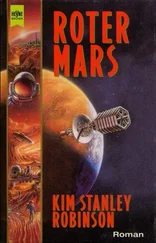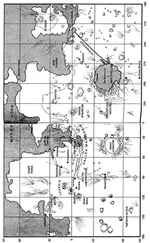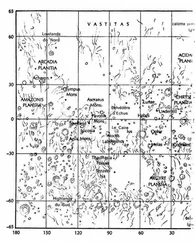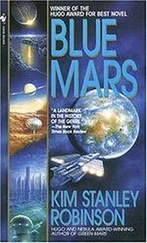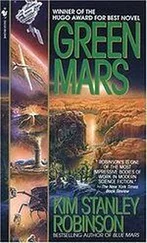Then she and Vlad were into the lock, and then inside the habitat. It still looked like a trailer home, but with the latest in kitchen fixtures. All the lights were on. The air was warm, and circulating well. The control panel looked like a nuclear power plant’s.
While the others came inside, Nadia walked down a row of small rooms, through door after door, and the oddest feeling suddenly came over her: things seemed out of place. The lights were on, some of them blinking; and down at the far end of the hall, a door was swinging slightly back and forth on its hinges.
Obviously the ventilation. And the shock of the habitat’s landing probably had disarranged things slightly. She shook off the feeling, and went back to greet the others.
• • •
By the time everyone had landed and walked across the stony plain (stopping, stumbling, running, staring off at the horizon, spinning slowly, walking again), and had entered into the three functioning habitats, and gotten out of their EVA suits, and put them away, and checked out the habitats, and eaten a bit, talking it all over the whole while, night had fallen. They continued working on the habitats and talking through most of that night, too excited to fall asleep; then most of them slept in snatches until dawn, when they woke and suited up and went out again, looking around and checking manifests and running machines through checks. Eventually they noticed they were famished, and went back in to jam down a quick meal— and then it was night again!
And that was what it was like, for several days: a wild swirl of time passing. Nadia would wake to the bip of her wrist console, and eat a quick breakfast looking out the habitat’s little east window. Dawn stained the sky rich berry colors for a few minutes, before shifting rapidly through a series of rosy tones to the thick pink-orange of daytime. All over the floor of the habitat her companions slept, on mattresses that would fold up against the wall during the day. The walls were beige, tinted orange by the dawn. The kitchen and living room were tiny, the four toilet rooms no more than closets. Ann would stir as the room lightened, and go to one of the four toilets. John was already in the kitchen, moving around quietly. Conditions were so much more crowded and public than they had been on the Ares that some of them were having trouble adjusting; every night Maya complained she couldn’t sleep in such a crowd, but there she was, mouth open girlishly. She would be the last to rise, snoozing through the noise and bustle of the others’ morning routines.
Then the sun would crack the horizon, and Nadia would be done with her cereal and milk, the milk made of powder mixed with water mined from the atmosphere (it tasted just the same); and it was time to get into her walker, and out to work.
The walkers were designed for the Martian surface, and were not pressurized like spacesuits, but were rather made of an elastic mesh, which held in the body at about the same pressure that the Terran atmosphere would have. This prevented the severe expansion bruising that would result if skin were exposed to Mars’s minimal atmosphere, but it gave the wearer a lot more freedom of movement than a pressurized spacesuit would have. Walkers also had the very significant advantage of being fail-operational; only the hard helmet was airtight, so if you ripped a hole at knee or elbow you would have a badly bruised and frozen patch of skin, but would not suffocate and die within minutes.
Getting into a walker, however, was a workout in itself. Nadia wriggled the pants over her long underwear, then got in the jacket and zipped the two sections of the suit together. After that she jammed into big thermal boots, and locked their top rings to the suit’s ankle rings; pulled on gloves, and locked the wrist rings; put on a fairly standard hard helmet, and locked it to the suit’s neck ring; then shouldered into an airtank backpack, and linked its air tubes to her helmet. She breathed hard a few times, tasting the cool oxygen-nitrogen in her face. The walker’s wristpad indicated that all the seals were good, and she followed John and Samantha into the lock. They closed the inner door; the air was sucked back into containers, and John unlocked the outer door. The three of them stepped outside.
It was a thrill every morning to step out onto that rocky plain, with the early morning sun casting long black shadows to the west, and the various small knolls and hollows revealed clearly. There was usually a wind from the south, and loose fines moved in a sinuous flow over the ground, so that the rocks sometimes seemed to creep. Even the strongest of these winds could scarcely be felt against an outstretched hand, but they hadn’t yet experienced one of the storm winds; at 500 kilometers per hour they were pretty sure to feel something. At twenty, nearly nothing.
Nadia and Samantha walked over to one of the little rovers they had uncrated and climbed in. Nadia drove the rover across the plain to a tractor they had found the day before, about a kilometer to the west. The morning cold cut through her walker in a diamond pattern, as the result of the X-weave of the heating filaments in the suit material. A strange sensation, but she had been colder in Siberia many a time, and she had no complaints.
They came to the big lander and got out. Nadia picked up a drill with a Phillips screwdriver bit, and started dismantling the crate on top of the vehicle. The tractor inside the lander’s crate was a Mercedes-Benz. She poked the drill into the head of a screw, pulled the trigger and watched the screw spin out. She picked up the screw and moved to the next, grinning. Innumerable times in her youth she had gone out in cold like this, with numb white chopped-up hands, and fought titanic battles to unscrew frozen or stripped screws. . but here it was ziiip , another one out. And really with the walker it was warmer than it had been in Siberia, and freer than in space, the walker no more restrictive than a thin stiff wetsuit. Red rocks were scattered all around in their uncanny regularity; voices chattered on the common band: “Hey, I found those solar panels!” “You think that’s something, I just found the goddamn nuclear reactor .” Yes, it was a great morning on Mars.
The stacked crate walls made a ramp to drive the tractor off the lander. They didn’t look strong enough, but that was the gravity again. Nadia had turned on the tractor’s heating system as soon as she could reach it, and now she climbed into the cab and tapped a command into its autopilot, feeling that it would be best to let the thing descend the ramp on its own, with her and Samantha watching from the side, just in case the ramp was more brittle in the cold than expected, or otherwise unreliable. She still found it almost impossible to think in terms of Martian g, to trust the designs that took it into account. The ramp just looked too flimsy!
But the tractor rolled down without incident, and stopped on the ground: eight meters long, royal blue, with wire-mesh wheels taller than they were. They had to climb a short ladder into the cab. The crane prosthesis was already attached to the mount on the front end, and that made it easy to load the tractor with the winch, the sandbagger, the boxes of spare parts, and finally the crate walls. When they were done, the tractor looked as overloaded and topheavy as a steam calliope; but the g made it only a matter of balance. The tractor itself was a real pig, with 600 horsepower, a wide wheelbase, and wheels big as tracks. The hydrazine motor had pickup even worse than diesel, but it was like the ultimate first gear, completely inexorable. They took off and rolled slowly toward the trailer park— and there she was, Nadezhda Cherneshevsky, driving a Mercedes-Benz across Mars! She followed Samantha to the sorting lot, feeling like a queen.
Читать дальше
Конец ознакомительного отрывка
Купить книгу


